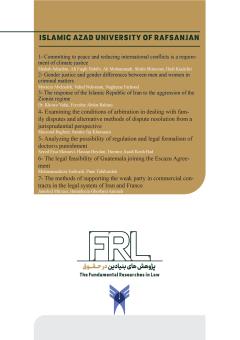Analyzing the feasibility of regulation and legal formalism of doctor's punishment
Subject Areas :Seyed Eisa Mousavi 1 , Hassan Heidari 2 , Hormoz Asadi Koohbad 3
1 - PhD student, Fiqh and Fundamentals of Islamic Law Department, Ramhormoz Branch, Islamic Azad University, Ramhormoz, Iran.
2 - Assistant Professor, Department of Law, Ahvaz Branch, Islamic Azad University, Ahvaz, Iran.
3 - Department of Jurisprudence and Fundamentals of Islamic Law, Ramhormoz Branch, Islamic Azad University, Ramhormoz, Iran.
Keywords: Tazeer, doctor, regulation and legal formalism, promotion of community health,
Abstract :
The use of Ta'zeer in Iran's legal system and the lack of specific rules in determining its process indicate that the lack of proper planning in its use has limitations and negative reactions towards doctors in order to improve the health of the society and their morale. Therefore, reading the law's lack of support from the medical community carefully and considering how the doctor's actions are improperly presented and determining the level of conflict with the law will determine the inconsistent reaction of punishment in response to the doctors' activities and the inappropriate performance of the legal system. Therefore, presenting a modern model centered on providing a thoughtful interpretation of ta'zeer and revising doctor's ta'zeer in certain cases causes support and patronage of doctors and non-attribution verification of some criminals. In addition to this, the possibility of legal regulation and formalism of doctor's punishment by measuring the effects of possible risk and creating a differential criminal policy for doctors' punishment and changing the legislator's attitude in possessions without permission and examples of protection, regulation and legal formalism of doctor's punishment in Klonin, euthanasia, etc. Improving the context of the health of the society and in addition, it reduces the indifference of doctors to treatment and the problem of indifference and indifference of doctors to treatment by not using tazeer.
1. امیری فرد، زهرا. (1395ش). بازخوانی ماهیت قاعده اقدام و کاربرد آن در مسئله اتانازی، مجله فقه و اجتهاد، شماره 5.
2. داوودی، مریم. (1387ش). شبیه سازی از منطر فقه شیعه، فقه و تاریخ تمدن، شماره 2.
3. رستمی نجفآبادی، حامد. (1390ش).بررسی قواعد فقهی تعزیرات،نشریه مطالعات تقریبی مذاهب اسلامی، شماره 23.
4. ریاحی، جواد. (1397ش). بررسی نظریه عمومیت مفهوم تعزیر، مطالعات فقه امامیه، شماره 10.
5. سجادی نسب، سیف الله. (1398ش). رویکرد جامعه شناختی فقهی-حقوقی به شفاعت در تعزیرات، مجله نشریه جامعه شناسی سیاسی ایران، شماره 7.
6. شاهبیگی، ایمان، (1398ش)، رویکرد نظریه تنظیمگري پاسخگو به مداخلههاي عدالت کیفري در جرائم علیه عفت عمومی در ایران(رساله دکتري)، تهران: دانشگاه تربیت مدرس.
7. قربانی، فتح الله. (1396ش). رهیافتی فقهی به معیار مشروعیت باروری زوجه توسط گامت بیگانه، فصلنامه حقوق پزشكی، شماره 42.
8. کافی، مصطفی. (1400ش). سیاست جنایی افتراقی در جرایم غیرعمد مستوجب دیه در پرتو کثرت گرایی نظام حقوق کیفری، مجله علمی پژوهشی حقوق پزشکی، شماره 15.
9. کیان مهر، مهدی، (1400ش)، تاثیر رجوع از اذن سابق بیمار در انگاره اثبات یا انکار مسئولیت پزشک، مجله فقه، شماره 3.
10. لطفی، اسدالله. (1398ش).رویکرد جامعه شناختي فقهی-حقوقي به شفاعت در تعزیرات، فصلنامه جامعه شناسي سياسي ای ران،
11. محمدی، روح الله.(1395ش). معایب و محاسن شبیه سازی انسان و آثار آن در فقه و حقوق، نشریه مطالعات علوم سیاسی، حقوق و فقه، شماره 4.
12. الهام، غلامحسین. (1402ش). امکانسنجی تنظیمگري کیفري درتعزیرات ازمنظر فقهامامیه، پژوهش نامه فقه اجتماعی، شماره 22.
13. یاوري، اسدالله. (1393ش). درآمدي بر مفهوم تنظیمگري، مطالعات حقوق تطبیقی، شماره 5.


